“Epigenetics” is an area of scientific research, which has gradually infiltrated various industries, including cosmetics, over the years. But what exactly is epigenetics, and why is it relevant to cosmetics?
Essentially, epigenetics, a term coined in biology, refers to a set of instructions that regulate gene activity without altering the DNA sequence.
These instructions, influenced by factors such as environment, lifestyle, and experiences, dictate when genes are turned on or off. While they don’t change our genes, they significantly impact our health and appearance.
Understanding epigenetics is extremely beneficial in cosmetics as it informs skincare and haircare formulations tailored to individual needs, addressing concerns like ageing and treatment response effectively.
Understanding How Epigenetics Works
Epigenetic mechanisms control gene activity without changing the DNA sequence. As biological research progresses, other mechanisms are likely to be discovered, and currently the key types include:
- DNA methylation, which adds a chemical tag to DNA.
- Histone modification, altering proteins around which DNA is wound.
- Non-coding RNAs, like microRNAs, that can influence gene expression.
- Chromatin remodelling, which adjusts how tightly DNA is packaged.
- As well as changes that can be inherited across generations.
These mechanisms respond to factors like diet, stress, and environmental exposures, influencing traits such as ageing, disease susceptibility, and hair or skin characteristics 1,2,3,4.
The Science Behind Youthful Skin
Epigenetics reveals how our skin ages. DNA methylation and histone changes play big roles. As we age, these processes shift, leading to wrinkles, lines, and less bounce in our skin.
Understanding these changes helps explain why skin ages and how it happens. It’s like a roadmap guiding scientists to develop treatments and skincare products that target these specific changes.
By addressing epigenetic factors, we can slow down ageing and keep our skin looking youthful for longer. It’s not just about creams and serums; it’s about understanding the science behind our skin’s journey through time.
Combatting Ageing with Epigenetic Cosmetics
“Epigenetic cosmetics” offer a new frontier in fighting ageing.
These formulations are designed to target specific changes in gene activity that occur as we age. By using ingredients that affect epigenetic processes, like DNA methylation and histone modification, these cosmetics can boost collagen production, repair skin cells, and bring back youthful gene patterns.
It’s like giving our skin a fresh start, helping it to regain its firmness, smoothness and vitality. With epigenetic cosmetics, we’re not just covering up wrinkles; we’re addressing the root causes of ageing, offering a promising path to more youthful and radiant skin.
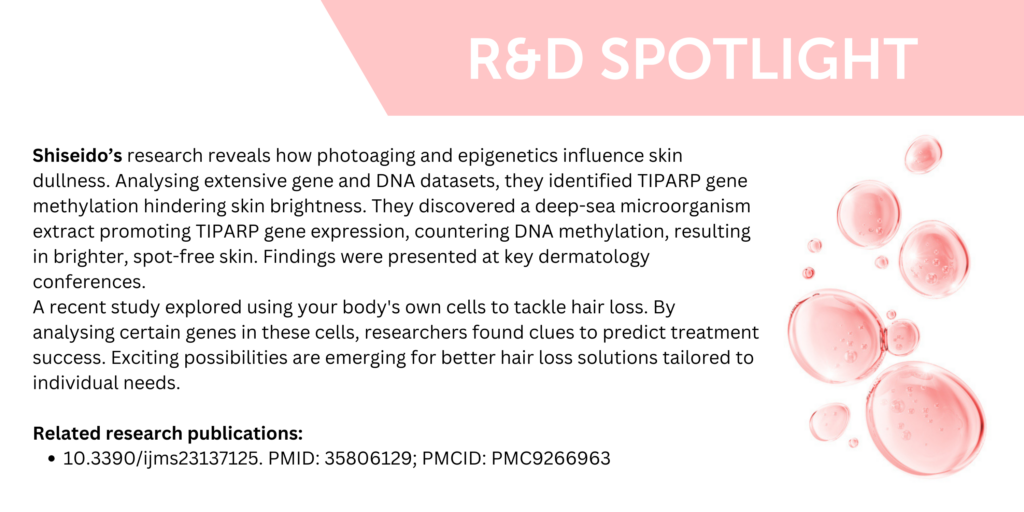
Addressing Hyperpigmentation
Hyperpigmentation disorders like melasma and age spots can originate from epigenetic changes. These alterations can lead to overproduction of melanin, leading to uneven skin tone.
Epigenetic-based skincare aims to counteract these changes by regulating melanin production. Formulations may include ingredients targeting DNA methylation and histone modification to restore balanced gene expression in melanocytes.
By addressing these underlying epigenetic disproportions, these skincare solutions can help fade pigmentation irregularities and promote a more even complexion. Through the science of epigenetics, skincare advances toward personalized treatments tailored to individuals’ unique skin needs, offering hope for those seeking effective solutions for hyperpigmentation.
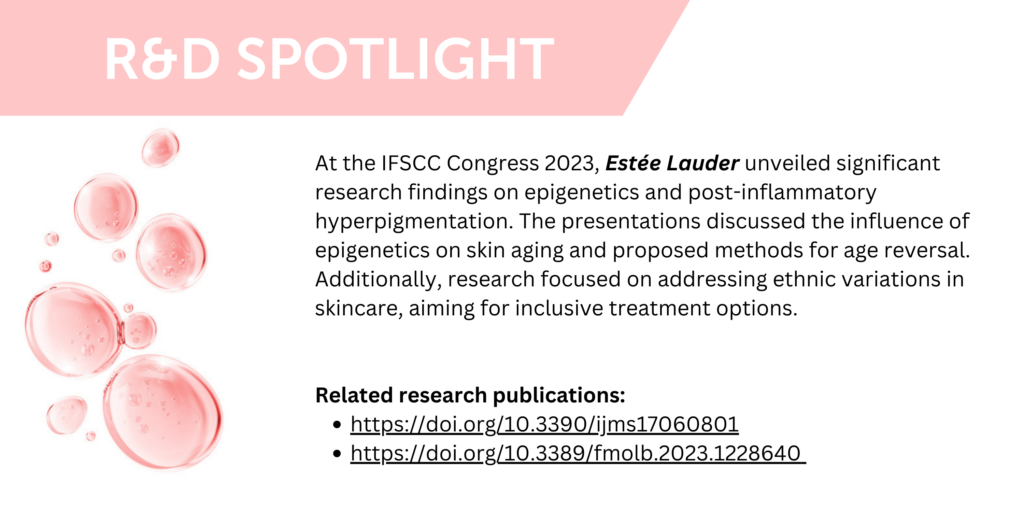 Protecting Skin from Environmental Stressors
Protecting Skin from Environmental Stressors
Environmental stressors like UV radiation, pollution, and stress induce epigenetic modifications in skin cells, contributing to ageing and damage.
Epigenetic-targeted cosmetics can address this by fortifying the skin’s defences against these stressors. Formulations may incorporate ingredients like antioxidants and DNA repair enzymes to counteract epigenetic damage and promote healthier gene expression patterns 5. For instance, sunscreen, a vital component of skincare, shields against harmful UV rays, preventing epigenetic changes linked to ageing and skin cancer.
Hydrating and Strengthening the Skin Barrier
Epigenetics regulates genes that are responsible for skin hydration and barrier function, which is crucial for healthy skin.
Epigenetic-based skincare formulations hold promise in restoring moisture and reinforcing the skin barrier. By targeting DNA methylation and histone modifications, these products can promote optimal gene expression patterns, enhancing hydration and resilience.
Ingredients like ceramides and hyaluronic acid further support skin barrier integrity, sealing in moisture and preventing water loss. Through epigenetic modulation, skincare advances toward personalized solutions tailored to individual skin needs, ensuring hydration and strength for a healthier, more resilient complexion.
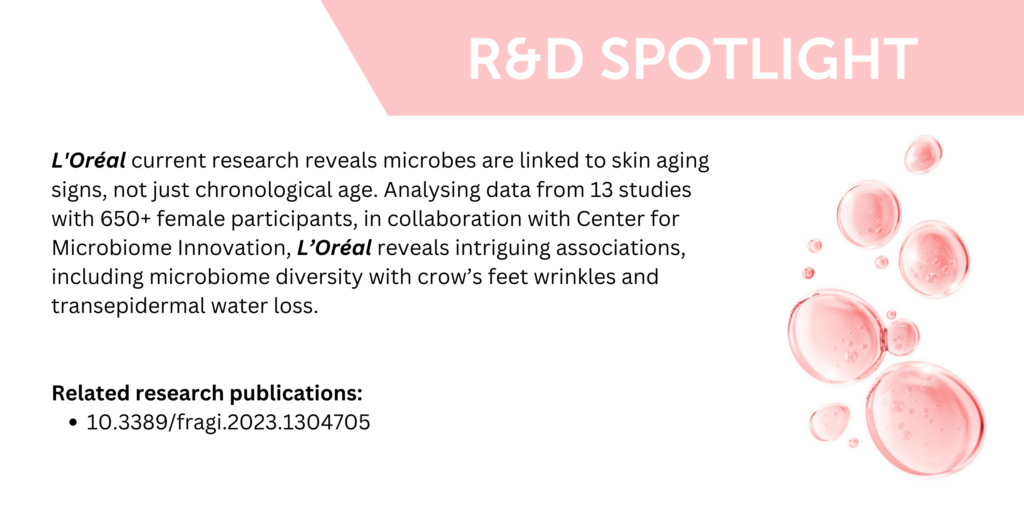 Personalized Skincare Solutions
Personalized Skincare Solutions
Personalized skincare is on the rise, partially thanks to advancements in epigenetic profiling technologies 6,7. These innovations enable the customization of cosmetic products based on individual epigenetic profiles, addressing specific genetic predispositions and skin concerns.
By analysing epigenetic markers, such as DNA methylation patterns, skincare brands can offer tailored solutions for each person’s unique needs. This personalized approach to beauty ensures that individuals receive targeted treatments that maximize effectiveness and promote skin health.
As the trend continues to grow, consumers can expect a more precise and personalized skincare experience, enhancing their beauty routines with science-backed solutions.
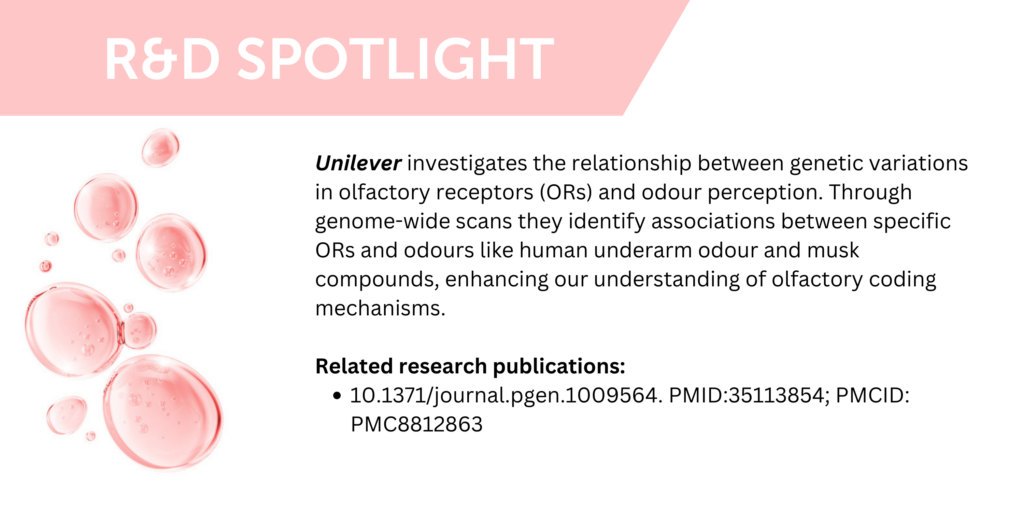 The Future of Epigenetic Cosmetics
The Future of Epigenetic Cosmetics
Many advanced studies in epigenetics are still in their early stages of experimentation, and it will take time to translate these findings into market-ready products. The full scope of the efficacy of topical applications on genetic influences remains to be comprehensively understood and explored.
However, looking ahead, epigenetics will continue to be not only relevant but also at the forefront of beauty innovation.
With ongoing technological advancements in biological sciences and continued investment from leading cosmetics brands, the focus on incorporating epigenetics into cosmetic products is poised for significant growth. Factors such as increasing disposable incomes, progressive lifestyles, and heightened beauty consciousness will drive demand for innovative skincare solutions among consumers.
Moreover, the Asia-Pacific region, with its increasing consumer spending on premium skincare and the influence of global beauty trends on millennials and Gen Z, is expected to experience similar growth. This will enable the development of personalized skincare solutions tailored to individual genetic profiles.
Bibliography
1. He J, He H, Qi Y, Yang J, Zhi L, Jia Y. Application of epigenetics in dermatological research and skin management. J Cosmet Dermatol. 2022 May;21(5):1920-1930. doi: 10.1111/jocd.14355. Epub 2021 Aug 6. PMID: 34357681.
2. Andersen B, Millar S. Skin epigenetics. Exp Dermatol. 2021 Aug;30(8):1004-1008. doi: 10.1111/exd.14418. Epub 2021 Jul 5. PMID: 34223679; PMCID: PMC8664073.
3. Tiffon C. The Impact of Nutrition and Environmental Epigenetics on Human Health and Disease. Int J Mol Sci. 2018 Nov 1;19(11):3425. doi: 10.3390/ijms19113425. PMID: 30388784; PMCID: PMC6275017.
4. Bollati, V., Baccarelli, A. Environmental epigenetics. Heredity 105, 105–112 (2010). https://doi.org/10.1038/hdy.2010.2.
5. Weinhold B. Epigenetics: the science of change. Environ Health Perspect. 2006 Mar;114(3):A160-7. doi: 10.1289/ehp.114-a160. PMID: 16507447; PMCID: PMC1392256.
6. Mehrmohamadi M, Sepehri MH, Nazer N, Norouzi MR. A Comparative Overview of Epigenomic Profiling Methods. Front Cell Dev Biol. 2021 Jul 22;9:714687. doi: 10.3389/fcell.2021.714687. PMID: 34368164; PMCID: PMC8340004.
7. Orioli D, Dellambra E. Epigenetic Regulation of Skin Cells in Natural Aging and Premature Aging Diseases. Cells. 2018 Dec 12;7(12):268. doi: 10.3390/cells7120268. PMID: 30545089; PMCID: PMC6315602.
Feeling inspired to see ingredients and trends in action?
Then why not visit one of the in-cosmetics events around the world?


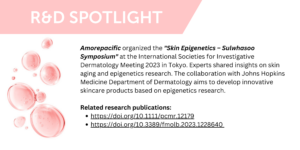
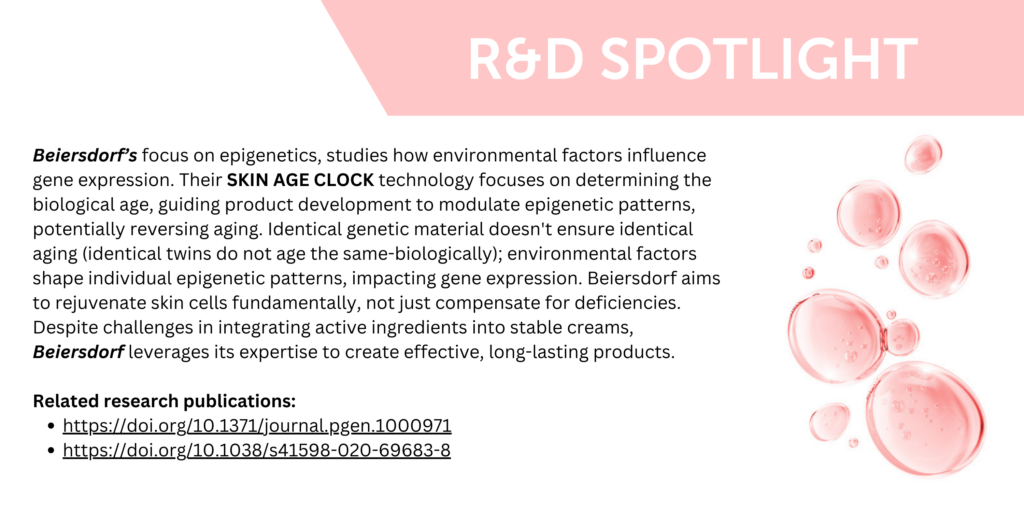
Epigenetics can be used to help determine which type of cancer a person has or can help to find hard to detect cancers earlier.
Very valuable article. Excellent performance by Dr Awanthi De Silva. Lot of new things to learn about epigenetic cosmetics . Keep it up your good work . Best of luck for your future endeavors .